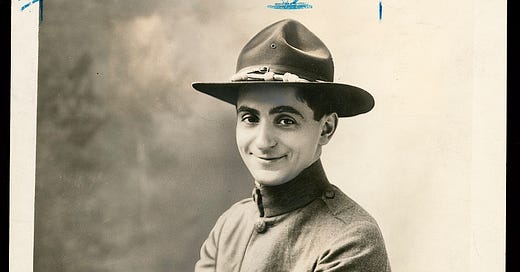"Irving Berlin has no place in American music - he is American music."
Born as Israel Beilin on May 11, 1888, to a Jewish family in Russia, Irving's life began in turmoil. His family fled their homeland to escape the brutal pogroms and other forms of religious persecution, arriving in New York City in 1893. Like many immigrants settling in the Lower East Side, the Beilin family struggled to make ends meet. All the children worked, and when Irving's father died, Irving, the youngest at thirteen years old, dropped out of school to find work as well, taking a job selling newspapers.
The work was sufficient for some time, but wanting to earn more money, Irving turned to singing at local saloons, where following in the footsteps of his father who had been a cantor, Irving's passion and talent for music began to grow. The saloon, however, was no place for a boy his age. After nearly losing his life when he was stabbed during a fistfight, Irving took a job working as a singing waiter at a cafe, where he continued to learn the art, along with songwriting.
Yet, deeply ambitious and hard-working, Irving desired more and began releasing his own music. In 1911, he earned his big break with the hit song "Alexander's Ragtime Band," a tune that captured the spirit of a changing America. The song's infectious rhythms and catchy melodies resonated deeply with audiences. As one critic said, "In a few days, 'Alexander' will be whistled on the streets and played in the cafés. It is the most meritorious addition to the list of popular songs introduced this season." The critic was right.
From there, Irving’s career grew. During the 1920s and 1930s, he solidified his place as one of the most influential figures in American music, expanding his reach to Broadway and Hollywood. His contributions to Broadway musicals, such as Watch Your Step (1914) and As Thousands Cheer (1933), showcased his ability to blend humor, emotion, and cultural commentary in his songs. In Hollywood, he scored hits for classic films like Top Hat (1935), featuring Fred Astaire and Ginger Rogers, with the iconic song "Cheek to Cheek." By the time the 1940s arrived, Irving had firmly established himself as a dominant force in both popular music and American culture, uniquely able to capture the country's mood.
This ability led to the release of one of his most iconic works, "White Christmas," written during World War II and debuting in the 1942 film Holiday Inn, starring Bing Crosby. With its themes of longing for peace and the comforts of home, it became an anthem for soldiers stationed overseas, offering solace during the holidays in lyrics such as "I'm dreaming of a white Christmas, just like the ones I used to know," which evoked feelings of homesickness and hope, capturing the hearts of millions. Bing's recording of the song became the best-selling single of all time, with over 50 million copies sold worldwide.
Throughout his career, Irving wrote over 1,000 songs. He wrote songs for soldiers, immigrants, and ordinary Americans, effortlessly shifting between sentimental ballads, jazzy numbers, and patriotic anthems. His music was both a reflection of the American experience and a unifying force during difficult times.
On September 22, 1989, Irving passed away at the age of 101.
Sources:
Herman, Jay. Americanizing America: Irving Berlin’s Influence On His Adopted Culture. 2010. Student Research and Creative Works. University of Puget Sound, JSTOR, https://jstor.org/stable/community.36391412. Accessed 8 Oct. 2024.
“Irving Berlin.” https://www.irvingberlin.com/biography
Jablonski, Edward. Irving Berlin: American Troubadour. Henry Holt and Co., 1999
White Studio, photographer. Irving Berlin, now a sergeant in the United States Army, who has written the military revue "Yip, Yip, Yaphank" at the Century Theatre, beginning Monday, Aug. 19th. [Place not identified: Publisher not identified] Photograph. Retrieved from the Library of Congress, <www.loc.gov/item/2016652339/>.
A couple of songs by Irving:
"God Bless America"
“White Christmas”





His anthem “God bless America “ is a timely reminder of the deep gratitude an emigrant felt for just being in the country that saved him. His arrival has truly been a blessing to America.